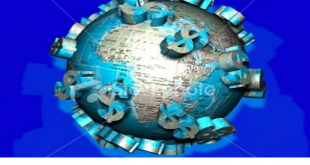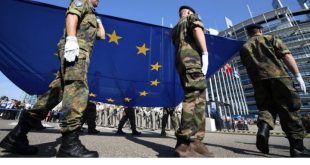Far from serving as a stabilizing force, NATO’s presence in the Indo-Pacific would inflame regional tensions without providing increased security.
Since identifying China as a “systemic challenge” in its 2022 Strategic Concept, NATO has been pursuing closer strategic and operational relations with Japan, Australia, South Korea, and New Zealand, collectively known as its Indo-Pacific Four (IP4) partners. According to recent reports, NATO leadership plans came closer to formalizing a NATO+IP4 security alignment at this week’s summit in Washington, DC. NATO justifies its expansion into the Asia-Pacific as essential for maintaining the global rules-based order. European scholar Luis Simon has argued that a NATO+IP4 security partnership would create a “cross-theater deterrence ecosystem for Europe and the Indo-Pacific” capable of countering “great power revisionism” in both regions.
The prospect of a NATO+IP4 security regime is deeply problematic. Far from serving as a stabilizing force, a formal NATO+IP4 security partnership would almost certainly exacerbate regional security tensions without providing a means to de-escalate. A NATO+IP4 regime would likely undermine the region’s security order and escalate tensions among states that currently manage their security concerns through dialogue and restraint. Asian states, including those with close ties to Europe and the United States, would likely see a formal NATO+IP4 security structure more as a Western provocation rather than a defensive alliance.
Central to this provocation is NATO’s recent focus on China and its declared intent to counter Beijing’s “stated ambitions and coercive policies” to protect NATO member states’ “interests, security, and values.” While some may question whether China’s ambitions in Asia threaten joint Transatlantic interests, Beijing’s perspective is unequivocal. The Chinese leadership has repeatedly stated that it views NATO’s expansion into Asia as a direct threat and has vowed to respond proportionately. Chinese scholarship routinely criticizes NATO’s “Cold War-era group confrontation” mentality and advocates for a militarized response should NATO+IP4 attempt to impose a new security order in Asia. As part of this response, which would include Chinese force restructuring, a NATO+IP4 agreement would almost certainly cause a regional arms race.
Neither would China be alone in seeing NATO’s Asia-Pacific expansion as an existential threat. North Korea and Russia, for instance, would view a NATO+IP4 partnership as a significant new Western-led security challenge, one Pyongyang and Moscow would respond to militarily. North Korea would further develop its nuclear capacity, correctly seeing it as the essential component of its deterrence strategy, and Russia would invest further in its Pacific Fleet, which is currently home to its most advanced nuclear-powered ballistic missile submarines.
Critically, a NATO+IP4 partnership would likely strengthen military cooperation between China, Russia, and North Korea. This cooperation, a secondary consequence of NATO’s support for Ukraine, already shows signs of long-term negative implications for Asia’s security. Such cooperation would extend into the Arctic region, where Russia holds significant territorial and operational advantages over NATO members.
While Western defense analysts might dismiss these authoritarian states’ concerns as irrelevant, it is notable that much of the rest of Asia disagrees. While Asia-Pacific states are concerned about regional stability, they see Western involvement, including NATO, as much of a source of instability as China, North Korea, and Russia. They are equally adamant that no actor or group of actors work in ways that disrupt the current status quo.
Southeast Asian states, for instance, largely oppose an expanded NATO presence in Asia as it would complicate ASEAN’s security and defense dialogues, particularly concerning maritime security in the South China Sea. Countries like Malaysia and Indonesia would likely strongly object to a more active role for European and American militaries in Southeast Asia, fearing increased tensions and divisions among ASEAN member states. There is almost no demand among Southeast Asian states for NATO involvement in Asian security affairs.
Aside from these strategic pitfalls, the potential benefits of NATO expansion into Asia are unclear. NATO member states lack the resources to affect the balance of power in the Asia-Pacific, struggling even to counter Russian aggression in Europe. NATO intervention in regional hotspots such as the Korean Peninsula, the Taiwan Strait, or the South China Sea would not deter regional actors like China or North Korea, both of which are nuclear powers with far larger militaries than any NATO state except the US. Additionally, NATO’s European member states lack the mature defense-industrial bases needed to project and sustain extra-regional power effectively.
Politically, NATO is at a crossroads, having spent the last two years unsuccessfully supporting Ukraine in its war with Russia. Public support for the alliance is waning in key member states like France, Germany, and the United States, with far-right NATO-skeptic parties gaining power and influence across Europe. The potential return to office of former President Trump, who has indicated he would reconsider U.S. involvement in NATO, poses the most immediate threat to the alliance.
Instead of formalizing a NATO+IP4 structure at its upcoming summit in Washington, NATO members should refocus on trans-Atlantic security affairs, where it can be most impactful. NATO leadership should leave Asian security to Asian states, which are more attuned to regional challenges and more intent on finding negotiated outcomes to the region’s outstanding security challenges. For NATO leadership, more generally, it is critical to realize that the world has become multi-polar and that there is less appetite among regional states for trans-Atlantic military intervention, if indeed there ever was before.
By: Jeffrey Reeves
Jeffrey Reeves is a Senior Washington Fellow at the Institute for Peace and Diplomacy and an Associate Professor at the U.S. Naval War College. All analysis is his own and not a reflection of U.S. government policy.
 Tehran Institute For International Studies tiis
Tehran Institute For International Studies tiis



